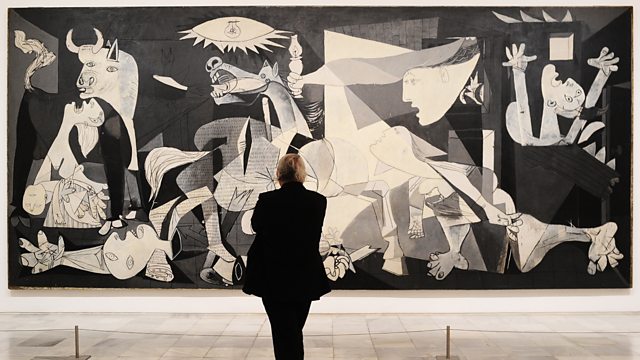Picasso's Guernica
Melvyn Bragg and guests discuss Pablo Picasso's Guernica, which he painted in 1937 soon after the bombing of that Basque town in the Spanish Civil War, and its wider context.
Melvyn Bragg and guests discuss the context and impact of Pablo Picasso's iconic work, created soon after the bombing on 26th April 1937 that obliterated much of the Basque town of Guernica, and its people. The attack was carried out by warplanes of the German Condor Legion, joined by the Italian air force, on behalf of Franco's Nationalists. At first the Nationalists denied responsibility, blaming their opponents for creating the destruction themselves for propaganda purposes, but the accounts of journalists such as George Steer, and the prominence of Picasso's work, kept the events of that day under close scrutiny. Picasso's painting has gone on to become a symbol warning against the devastation of war.
With
Mary Vincent
Professor of Modern European History at the University of Sheffield
Gijs van Hensbergen
Historian of Spanish Art and Fellow of the LSE Ca帽ada Blanch Centre for Contemporary Spanish Studies
and
Dacia Viejo Rose
Lecturer in Heritage in the Department of Archaeology at the University of Cambridge
Fellow of Selwyn College
Producer: Simon Tillotson.
Last on
LINKS AND FURTHER READING
Hershel B. Chipp, Picasso鈥檚 Guernica: History, Transformations, Meanings (University of California Press, 1992)
Gijs van Hensbergen, Guernica: The Biography of a Twentieth-Century Icon (Bloomsbury Publishing, 2005)
Francoise Gilot and Carlton Lake, Life with Picasso (Virago, 1990)
Helen Graham, The Spanish Civil War: A Very Short Introduction (Oxford University Press, 2005)
Ian Patterson, Guernica and Total War (Profile Books, 2007)
Roland Penrose, Picasso: His Life and Work (University of California Press, 1992)
Paul Preston, We Saw Spain Die: Foreign Correspondents in the Spanish Civil War (Constable, 2009)
Paul Preston, The Destruction of Guernica (Harper Collins, 2010)
Nicholas Rankin, Telegram from Guernica: The Extraordinary Life of George Steer, War Correspondent (Faber and Faber, 2013)
Marie Louise S. S酶rensen and Dacia Viejo-Rose (eds.), War and Cultural Heritage: Biographies of Place (Cambridge University Press, 2015)
Herbert Southworth, Guernica! Guernica!: A Study of Journalism, Diplomacy, Propaganda and History (University of California Press, 1992)
George Steer, The Tree of Gernika: A Field Study of Modern War (first published 1938; Faber and Faber, 2011)
Gordon Thomas and Max Morgan Witts, Guernica: The Crucible of World War II (first published 1975; Scarborough House, 1991)
Dacia Viejo-Rose, Reconstructing Spain: Cultural Heritage and Memory after Civil War (SAP/Ca帽ada Blanch, 2014)
Credits
| Role | Contributor |
|---|---|
| Presenter | Melvyn Bragg |
| Interviewed Guest | Mary Vincent |
| Interviewed Guest | Gijs van Hensbergen |
| Interviewed Guest | Dacia Viejo Rose |
| Producer | Simon Tillotson |
Broadcasts
- Thu 2 Nov 2017 09:00麻豆社 Radio 4
- Thu 2 Nov 2017 21:30麻豆社 Radio 4
Featured in...
![]()
20th Century—In Our Time
Browse the 20th Century era within the In Our Time archive.
![]()
Culture—In Our Time
Popular culture, poetry, music and visual arts and the roles they play in our society.
![]()
History—In Our Time
Historical themes, events and key individuals from Akhenaten to Xenophon.
In Our Time podcasts
Download programmes from the huge In Our Time archive.
The In Our Time Listeners' Top 10
If you鈥檙e new to In Our Time, this is a good place to start.
Arts and Ideas podcast
Download the best of Radio 3's Free Thinking programme.
Podcast
-
![]()
In Our Time
Melvyn Bragg and guests discuss the ideas, people and events that have shaped our world.



